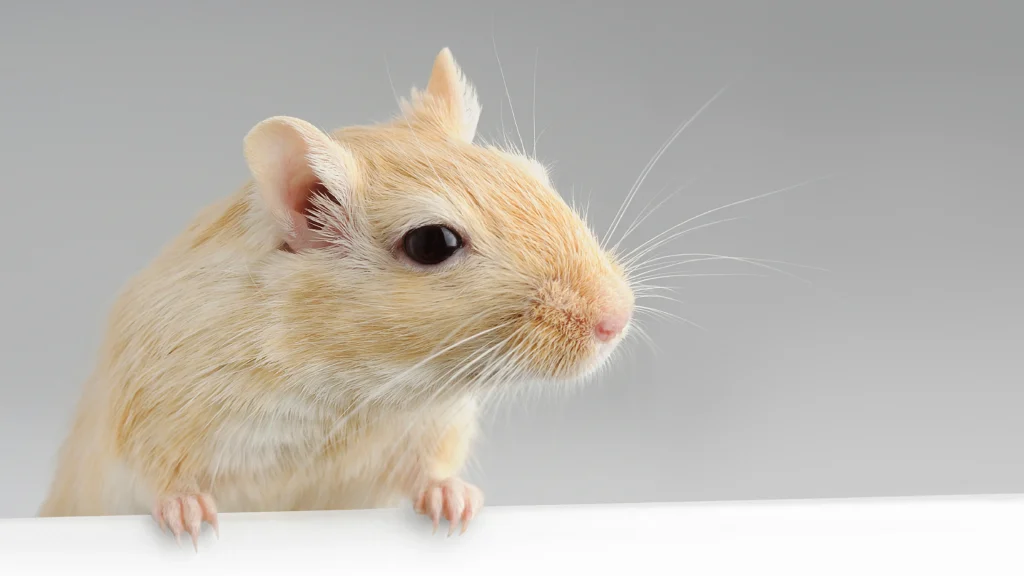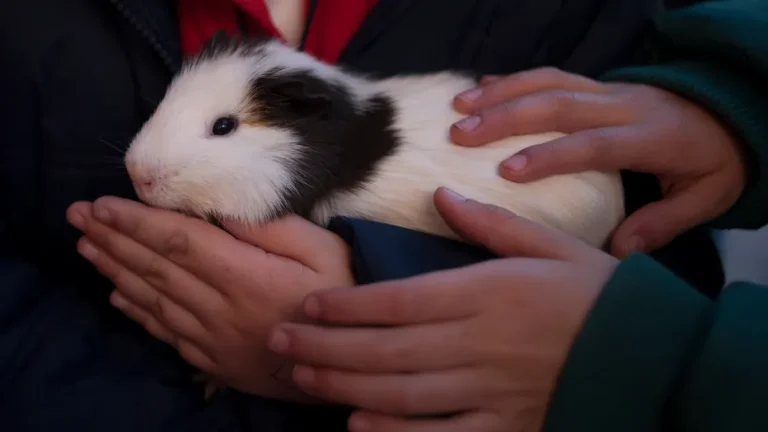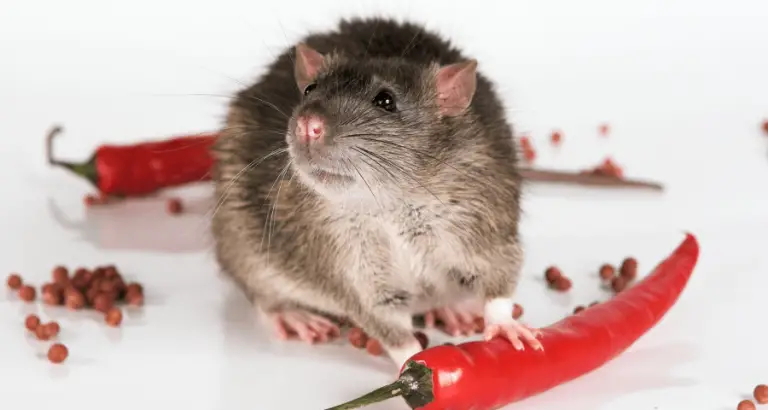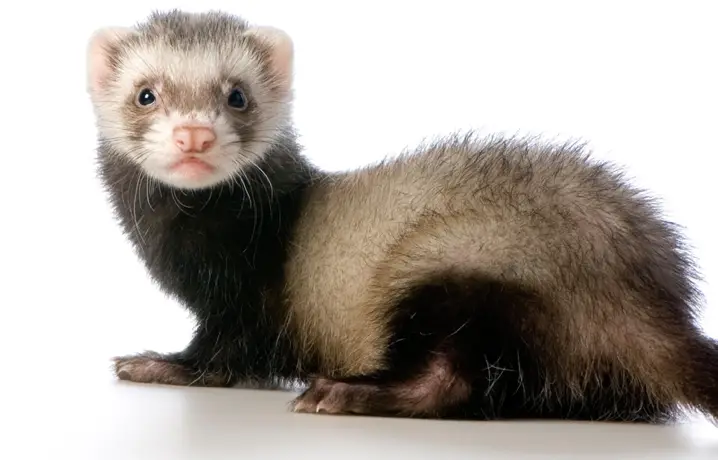Can Gerbils Overheat?
Gerbils can overheat, which can be shocking and dangerous for their well-being. In hot environments, gerbils are prone to heatstroke, which can lead to severe health issues or even death.

They must be provided with a suitable and cool habitat to avoid overheating. It is crucial to be aware of the signs of overheating in gerbils and take immediate action to prevent any harm. Regular monitoring of the temperature and ensuring proper ventilation and hydration for gerbils are essential steps in keeping them safe and comfortable.

Signs Of Heat Stress: How To Recognize The Problem
Gerbils are prone to heat stress, and it is crucial to recognize the signs. This article reveals the shocking truth about gerbils overheating and provides insights into how to identify the problem.
Excessive panting and drooling:
- Gerbils regulate their body temperature by panting, which helps to evaporate moisture from their respiratory system. If you observe excessive panting and drooling in your gerbil, it could be an indication of heat stress.
- Excessive panting and drooling are signs that your gerbil is trying to cool down. This behavior may be accompanied by an open-mouthed or gasping appearance.
Lethargy and reduced activity levels:
- Heat stress can cause gerbils to become lethargic and have reduced activity levels. They may appear more sluggish or spend increased time sleeping.
- It’s important to pay attention to changes in your gerbil’s behavior. If you notice that they are not as active as usual, it could be a sign of overheating.
Loss of appetite and dehydration:
- Overheated gerbils may experience a loss of appetite and dehydration. They may refuse to eat or drink as much as they usually do.
- Dehydration can lead to serious health issues, so it’s crucial to ensure your gerbil has access to fresh water and monitor their water intake closely during hot weather.
Recognizing the signs of heat stress in gerbils is crucial for their well-being. Keep a close eye on your gerbil’s behavior, especially during hot weather, and look out for excessive panting and drooling, lethargy and reduced activity levels, and loss of appetite and dehydration.
If you notice any of these symptoms, take immediate steps to cool down your gerbil, such as providing a cool, shaded area and access to fresh water. By being aware and proactive, you can help prevent heat-related health issues in your furry friend.
The Impact Of Heat Stress On Gerbil Health
Gerbils can experience the detrimental effects of heat stress, which can impact their health. Discover the shocking answer to whether gerbils can overheat and the consequences it can have on their well-being. Don’t underestimate the importance of managing heat stress for your furry friends!
Heat stress can have detrimental effects on the health of gerbils. The impact of heat stress on these small rodents can lead to increased risk of heat stroke and organ damage, weakening of the immune system, and potential for long-term health issues.
Let’s dive deeper into each of these aspects.
Increased Risk Of Heat Stroke And Organ Damage:
- Gerbils are extremely sensitive to heat and are prone to heat stroke. Their small bodies have a limited capacity to regulate body temperature, making them susceptible to overheating.
- Prolonged exposure to high temperatures can cause damage to the vital organs of gerbils, including their heart, lungs, liver, and kidneys.
- Heat stroke can lead to severe dehydration, lethargy, rapid breathing, loss of appetite, and even death if not promptly addressed.
Weakening Of The Immune System:
- Heat stress puts a significant strain on the immune system of gerbils, making them more vulnerable to infections and diseases.
- The elevated body temperature resulting from heat stress can suppress the immune response, making it difficult for gerbils to fight off pathogens and recover from illness.
Potential For Long-Term Health Issues:
- Heat stress can have long-lasting effects on gerbil health, even after the immediate danger has passed.
- Chronic exposure to high temperatures can lead to respiratory problems, gastrointestinal issues, and compromised reproductive performance in gerbils.
- It may also impact their overall well-being, reducing their lifespan and quality of life.
It is crucial to provide appropriate temperature regulation and prevent heat stress in gerbils to safeguard their health. Awareness of the risks associated with heat stress can help gerbil owners take necessary precautions to ensure their pets’ well-being.
Preventive Measures: Keeping Gerbils Cool And Safe
Gerbils are susceptible to overheating, which can be detrimental to their health. Implementing preventive measures such as providing adequate ventilation and a cool environment can ensure their safety and well-being.
Gerbils are cute and cuddly creatures, but they are also susceptible to overheating, which can be dangerous for their health. To ensure the well-being of your furry friends, it’s important to implement preventive measures to keep them cool and safe.
Providing A Cool And Well-Ventilated Living Environment:
- Choose a suitable location: Place your gerbil’s cage away from direct sunlight and heat sources such as radiators or heaters.
- Optimize airflow: Ensure that their living space is well-ventilated by keeping windows open or using fans to promote air circulation.
- Temperature control: Use a thermometer to monitor the temperature inside their enclosure. Keep it between 65 to 75 degrees Fahrenheit (18 to 24 degrees Celsius) to prevent overheating.
Using Appropriate Bedding And Cage Materials:
- Natural bedding: Opt for bedding materials such as aspen shavings, paper bedding, or shredded paper, which provide a cool and comfortable environment for gerbils.
- Avoid heat-absorbing materials: Stay away from materials like cedar or pine shavings, as they can retain heat and increase the risk of overheating.
- Cage positioning: Place the cage on an elevated platform or table, as this can prevent heat transfer from the surface below.
Implementing A Proper Hydration Strategy:
- Keep water accessible: Provide your gerbils with fresh water at all times. Use a water bottle with a sipper tube attached to the cage to minimize spillage and contamination.
- Frozen treats: Offer frozen fruits or vegetables to help cool your gerbils down during hot days. Freeze items like cucumber or watermelon slices for a refreshing treat.
- Moisture-rich foods: Incorporate hydrating foods into their diet, such as lettuce or cucumber. These can supplement their fluid intake during warm weather.
Remember, gerbils cannot regulate their body temperature as efficiently as humans, so it’s crucial to keep them cool and comfortable. By following these preventive measures, you can ensure their well-being and protect them from the dangers of overheating.
Cool Treats And Toys: Keeping Gerbils Engaged
Discover how to keep gerbils cool and engaged with cool treats and toys. Find out if gerbils can overheat and learn surprising facts about their temperature regulation. Keep your furry friend happy and healthy with these helpful tips.
Gerbils are small, active creatures that love to explore and play. However, it’s important to ensure they stay cool and don’t overheat, especially during hot weather. Providing them with cool treats and toys is a great way to keep them engaged while helping them stay comfortable.
In this section, we will explore a few options to consider: frozen fruits and veggies, chilled ceramic tiles, and interactive toys that encourage activity without overheating.
Frozen Fruits And Veggies As Refreshing Snacks:
- Frozen fruits and vegetables can provide a refreshing and nutritious treat for gerbils.
- Offer small pieces of frozen cucumber, watermelon, or green beans to your furry friends.
- Freezing these treats not only keeps your gerbils cool but also provides them with some much-needed hydration.
Chilled Ceramic Tiles For Cool Resting Spots:
- Ceramic tiles retain coolness for longer periods, making them ideal for gerbils to rest on.
- Place a few ceramic tiles in your gerbil’s enclosure and watch as they discover these comfortable cooling spots.
- Ensure the tiles are clean and room temperature before chilling them in the refrigerator for a few hours.
Interactive Toys That Encourage Activity Without Overheating:
- Gerbils love to stay active, but it’s important to provide them with toys that won’t cause them to overheat.
- Look for toys such as tunnels, exercise wheels, and puzzle feeders that engage their mind and stimulate their natural instincts.
- Avoid toys made of materials that can retain heat, as they may become uncomfortable for gerbils during warm weather.
Remember, keeping your gerbils cool and engaged is essential for their health and well-being. By offering frozen fruits and veggies as refreshing snacks, chilled ceramic tiles for cool resting spots, and interactive toys that encourage activity without overheating, you can ensure your gerbils stay happy and comfortable even on the hottest days of the year.
Gerbil Breeds And Heat Tolerance: Understanding Individual Differences
Gerbil breeds vary in their heat tolerance, and it’s crucial to understand the individual differences. Surprisingly, gerbils can overheat, so it’s important to provide them with the right environment and temperature regulation.
Can Gerbils Overheat? Shocking Answer!
Gerbils are adorable little creatures, but did you know that some gerbil breeds have a higher tolerance for heat than others? Understanding these individual differences is crucial to ensure the well-being of your furry friend. In this section, we will explore the variations in heat tolerance among different gerbil breeds and the factors that influence a gerbil’s ability to handle heat.
By tailoring care based on breed-specific needs, you can make sure your gerbil stays cool and comfortable even during the hottest days.
Variations In Heat Tolerance Among Different Gerbil Breeds:
- Some gerbil breeds, such as the Mongolian gerbil, have evolved to withstand extreme temperatures in their native habitats, making them more heat tolerant.
- Other breeds, like the Fat-tailed gerbil, may have lower heat tolerance due to their natural habitat’s milder climate.
- It’s important to research the specific breed of gerbil you have to understand their heat tolerance levels and adjust their environment accordingly.
Factors That Influence A Gerbil’S Ability To Handle Heat:
- Fur density: Gerbils with thicker fur may have a harder time dissipating heat and may be more susceptible to overheating.
- Activity level: Gerbils that are more active generate more body heat and may require additional cooling measures.
- Age: Young gerbils have less developed thermoregulation abilities and may be more sensitive to temperature fluctuations.
- Health conditions: Certain health conditions can impact a gerbil’s ability to regulate body temperature effectively.
Tailoring care based on breed-specific needs:
- Provide a cool environment: Keep your gerbil’s habitat in a well-ventilated area away from direct sunlight.
- Temperature control: Maintain a temperature range between 65°F and 75°F (18°C and 24°C) to ensure your gerbil’s comfort.
- Encourage airflow: Use fans or provide a gentle breeze to help regulate the temperature in your gerbil’s habitat.
- Substrate choices: Opt for cooler substrates such as ceramic tiles or sand, which can help dissipate heat.
- Hydration: Ensure a fresh supply of water at all times to keep your gerbil hydrated and aid in temperature regulation.
- Monitor behavior: Observe your gerbil for signs of overheating, such as excessive panting or lethargy, and take immediate action if necessary.
Understanding the variations in heat tolerance among different gerbil breeds and considering the factors that influence their ability to handle heat will help you provide the best care possible for your gerbil. By tailoring their environment and taking necessary precautions, you can ensure your gerbil remains happy and healthy, even in hot weather.
The Importance Of Heat Stress Awareness: Educating Gerbil Owners
Gerbils are prone to heat stress, making awareness crucial for their owners. Discover the startling truth: can gerbils overheat? It’s time to educate and protect these beloved pets.
Gerbils are adorable and popular pets known for their small size and friendly nature. However, many gerbil owners are unaware of the dangers that heat stress can pose to their furry friends. As responsible gerbil owners, it is crucial to educate ourselves about the impact of heat on our pets and take necessary precautions to ensure their well-being.
Dispelling Common Misconceptions About Gerbil Heat Tolerance:
- Gerbils can tolerate high temperatures: Contrary to popular belief, gerbils are highly sensitive to heat and can easily succumb to heat stress. It is important to create a suitable living environment for your gerbil by regulating the temperature in their cage.
- Gerbils can cool themselves down: Unlike humans, gerbils do not have sweat glands, and panting is an inadequate cooling mechanism for them. They rely on their environment to provide relief from heat. As owners, we must provide appropriate measures to help them stay cool.
- Gerbils are resistant to heat stroke: Heat stroke is a serious condition that can affect gerbils just like any other animal. Ignoring the signs and symptoms of heat stress can have detrimental effects on their health. It is crucial to be vigilant and proactive in preventing heat-related emergencies.
Providing Information On The Hidden Dangers Of Heat Stress:
- Dehydration: Heat stress can cause gerbils to become dehydrated, leading to a range of health issues. Water should always be readily available, and it is advisable to provide multiple water sources to encourage hydration.
- Respiratory distress: High temperatures can cause respiratory distress in gerbils, especially if the air is also humid. It is essential to maintain good ventilation and provide a cool and dry environment for them.
- Heat-related illnesses: Heat stress can lead to various health problems, such as heat exhaustion and heat stroke, which can be life-threatening for gerbils. Recognizing the signs, such as excessive panting, lethargy, and loss of appetite, is crucial for early intervention.
Promoting Responsible Gerbil Care Practices:
- Maintain a suitable temperature: The temperature in the gerbil’s environment should be kept between 65-75°F (18-24°C) to ensure their comfort. Avoid placing them near direct sunlight or in areas prone to excessive heat, such as next to heaters or radiators.
- Provide cooling options: Help your gerbil stay cool by offering frozen treats or placing ceramic tiles or chilled rocks in their cage. Additionally, you can use a small fan or air conditioner to regulate the temperature in the room.
- Monitor their behavior: Pay close attention to your gerbil’s behavior and look out for any signs of discomfort or distress. If you notice any unusual behavior or symptoms of heat stress, seek veterinary assistance immediately.
By educating ourselves about heat stress and implementing responsible care practices, we can ensure the well-being and happiness of our gerbil companions. Always remember to provide a safe and comfortable environment, monitor temperature levels, and take prompt action if you suspect your gerbil may be experiencing heat stress.
Let us prioritize their health and happiness by being informed gerbil owners.
Frequently Asked Questions Of Can Gerbils Overheat? Shocking Answer!
How Do I Know If My Gerbil Is Overheating?
Watch out for these signs of overheating in your gerbil: excessive panting, lethargy, redness in the ears, and seeking cool spots.
Can Gerbils Overheat?
Yes, gerbils can overheat if exposed to high temperatures for a prolonged period of time.
How Hot Can Gerbils Tolerate?
Gerbils can tolerate temperatures up to 80 degrees Fahrenheit (26. 6 degrees Celsius).
Are Gerbils Sensitive To Heat?
Yes, gerbils are sensitive to heat and can suffer from heatstroke or dehydration.
Conclusion
Overall, it is evident that gerbils can indeed overheat, which could have serious consequences for their health and well-being. Being sensitive to temperature changes, these small creatures require special care and attention to ensure they remain in a safe and comfortable environment.
By understanding the signs of overheating and taking necessary preventive measures, such as providing adequate ventilation, shade, and cool surfaces, we can help protect our pet gerbils from potential heat-related issues. Regularly monitoring their behavior, keeping an eye out for signs of distress, and taking swift action if overheating occurs is crucial.
Remember, gerbils rely on us to create a suitable habitat, and their welfare should never be compromised. By following these guidelines and providing a cool and comfortable living environment, we can safeguard our beloved gerbils and ensure they thrive in our care.







